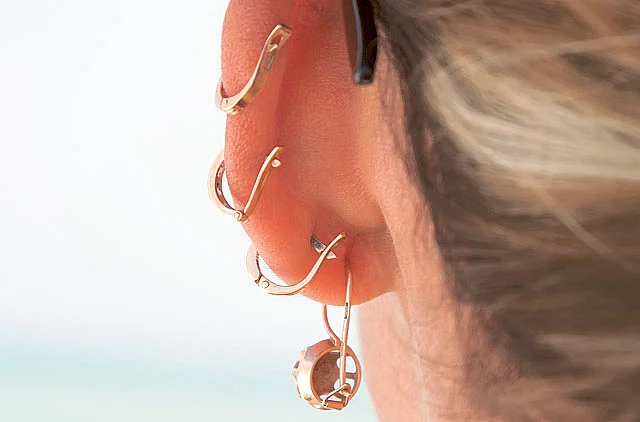Dubai: People often underestimate the potential health risks of getting their ears pieced by unqualified persons, said Dr Amin Al Amiri, Asst. Undersecretary for Medical Practice and License Sector in UAE Ministry of Health.
While there are many hygienic factors to consider when piercing your ear, professional medical assistance should be mandatory, said Al Amiri.
Issuing a decree in 2011 banning gold shops and pharmacies from carrying out piercings, the Ministry of Health only allows patients to get piercings at hospitals and medical clinics.
“The practice of piercing requires the pricking of the ear so all devices used should be sterilised and under the control of health professional,” said Al Amiri, adding that pharmacies and gold shops are neither designed to deal with patients nor can they practice surgical procedures.
The decree was also issued due to the amount of complaints received by the ministry about cases of poor hygiene which have resulted in infected piercings.
“If any of the people have a low platelet count or haemophilia in which the bleeding could continue, they should be under the observation of health professionals and doctors who can make sure that their health is properly maintained,” explained Al Amiri.
Employees at jewellery stores and pharmacies are not doctors or nurses and they are not fit to carry out any surgical procedure even if it is as small as a piercing, said Al Amiri.
The Ministry of Health has continued to carry out inspections at pharmacies across the UAE to make sure they are abiding by the rules of piercings, said Al Amiri.
“We continue to perform inspections on pharmacies and health centres, however, the municipality is responsible for jewellery shops,” he said.
Doctor's views
With many people underestimating the safety measures of getting a piercing, Gulf News talked to Dr Babu Shershad from the First Medical Centre in Dubai to clarify the common misconception.
Considering the fact that blood is involved in the procedure, Dr Shershad said that several precautions have to be taken when getting a piercing in order to prevent infections.
“You have to make sure that consumable material used is good quality and is of one-time use and not used multiple times from one patient to another,” he said emphasising the necessity of using disposable material.
Surgical procedure precautions should also be carried out when making a piercing, said Shershad.
“The person doing the piercing has to be trained and precautions have to be taken just like any other surgical procedure,” he said.
While there are several ways to make a piercing, the most viable method used at hospitals is through a piercing gun and a hypo-allergenic earring.
“The gun is easy to use but should be used precisely so that it does not injure the cartilage,” said Shershad, adding that manual piercings are no longer in practice.”
After getting the piercing, the doctor also recommended not changing the hypo-allergenic earring for two to three weeks to reduce the chance of bleeding and speed up the healing process.
While Shershad receives several patients with infected piercings, he confirmed that while most piercings are likely to get infected, tongue piercings in particular could lead to more complications.
“I would not advise people to get tongue piercings as there are is a higher chance of bleeding,” he said.
Getting any part of the body pierced without these precautions could lead to many serious health conditions.
“Some of the main risks if a piercing is not done well, include the transmission of infections such as Hepatitis B and C,” said Shershad, adding that even a tiny spec of blood can cause a high risk of transmission of disease.
Sign up for the Daily Briefing
Get the latest news and updates straight to your inbox
Network Links
GN StoreDownload our app
© Al Nisr Publishing LLC 2026. All rights reserved.
